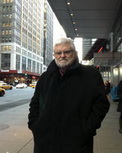 Chris
McDonnell, UK
Chris
McDonnell, UKchristymac733@gmail.com
 Chris
McDonnell, UK
Chris
McDonnell, UK
christymac733@gmail.com
Previous articles by Chris Comments welcome here
December
12, 2018
Gaia's
revenge

The scientist James Lovelock, now approaching his 100th year, has written extensively on the condition of our planet, warning of the consequences of uncontrolled atmospheric pollution and the subsequent global warming. He indicates in no uncertain terms, that time is not on our side.
That certainly gives pause for thought. Ours is the first generation to realise the dangerous predicament facing the Earth and ours is possibly the last generation who might be able to meet the challenge.
Speaking at the recent United Nations Conference on Climate change held in Katowice in Poland, Sir David Attenborough said: "The world's people have spoken. Time is running out. They want you, the decision-makers, to act now. Leaders of the world, you must lead. The continuation of civilisations and the natural world upon which we depend is in your hands."
In no uncertain terms the serious nature of the crisis now facing us is crystal clear. Either we do something significant or we risk the continuance of life on our planetary home. It is a position that has had the full weight of a papal encyclical. In 'Laudato Si', Francis makes clear the multifaceted climate crisis that we now face. He describes Earth as "an immense pile of filth", largely man-made. He declares that this causes "Sister Earth, along with all the abandoned of our world, to cry out, pleading that we take another course."
The International Paris Agreement of 2015 was a significant act of co-operation between many nations, for all have a part to play. International borders can be drawn on maps and traffic controls for both people and goods put in place. The air we breathe and the change to climate conditions that we are now experiencing ignores such artificial barriers - it is a global event.
Low level lands risk flooding from rising sea levels as the Polar Ice cover melts. The consequences are hard to imagine. Yet in a selectively selfish act, the government of the US recently withdrew from that Paris Agreement. Fortunately a number of Cities and States are implementing their own clean air policies, recognising the clear risk to our future of such government folly.
Writing in his book 'The revenge of Gaia', Lovelock made this stark comment. "We cannot regard the future of the civilized world in the same way as we see our personal futures. It is careless to be cavalier about our own death. It is reckless to think of civilization's end in the same way."
How do we explain to our children and grandchildren that we are gambling with their future by our present inability to co-operate for meaningful change?
In earlier years, a question of this complexity was beyond comprehension. 'Laudato Si' is a document of our time, challenging the accepted norms; it is a Christian response of great value.
As Christians we cannot afford to ignore the potential catastrophe that faces all life on Earth. NASA has recently landed a vehicle from our Earth on our planetary neighbour, the red planet, Mars. It carries that title due to its desert aridity and loss of atmosphere. How that loss occurred is unknown; what is sure is that we are presently taking the first steps into a risk-laden future for our own Earthly home. We cannot afford to be casual in the need to find alternative sources of energy.
Too often the hallmark of present political and national activity is marked by a selfish policy that is both small-minded and inward looking. Our credibility is called to question.
By the time this piece is published, our national parliament will have held the debate and consequent vote on our future relationship with our European neigbours. How our national journey will be undertaken in the coming years is unclear to say the least. What is sure is that a time of healing and coming together will be called for as our democracy is presently challenged by unprecedented difficulty.
The theme of 'Gaia' that inspired so much of Lovelock's later writing recognises the Earth as a living entity. We ignore that concept at our peril. It is dangerous to play roulette with the rules.
The Noosphere, the 'thinking layer' that envelops our earth, a concept developed, with others, by the French Jesuit, Teilhard de Chardin emphasises our inter-dependence.
The days of Advent are now with us, a time of preparation, a time of waiting. The theologian Paul Tillich wrote that "our time is a time of waiting; waiting is its special destiny. And every time is a time of waiting, waiting for the breaking in of eternity.
All time runs forward. All time, both history and in personal life, is expectation. Time itself is waiting, waiting not for another time but for that which is eternal".
Our time is now, our responsibility heavy. We await the Christ-Child.
====